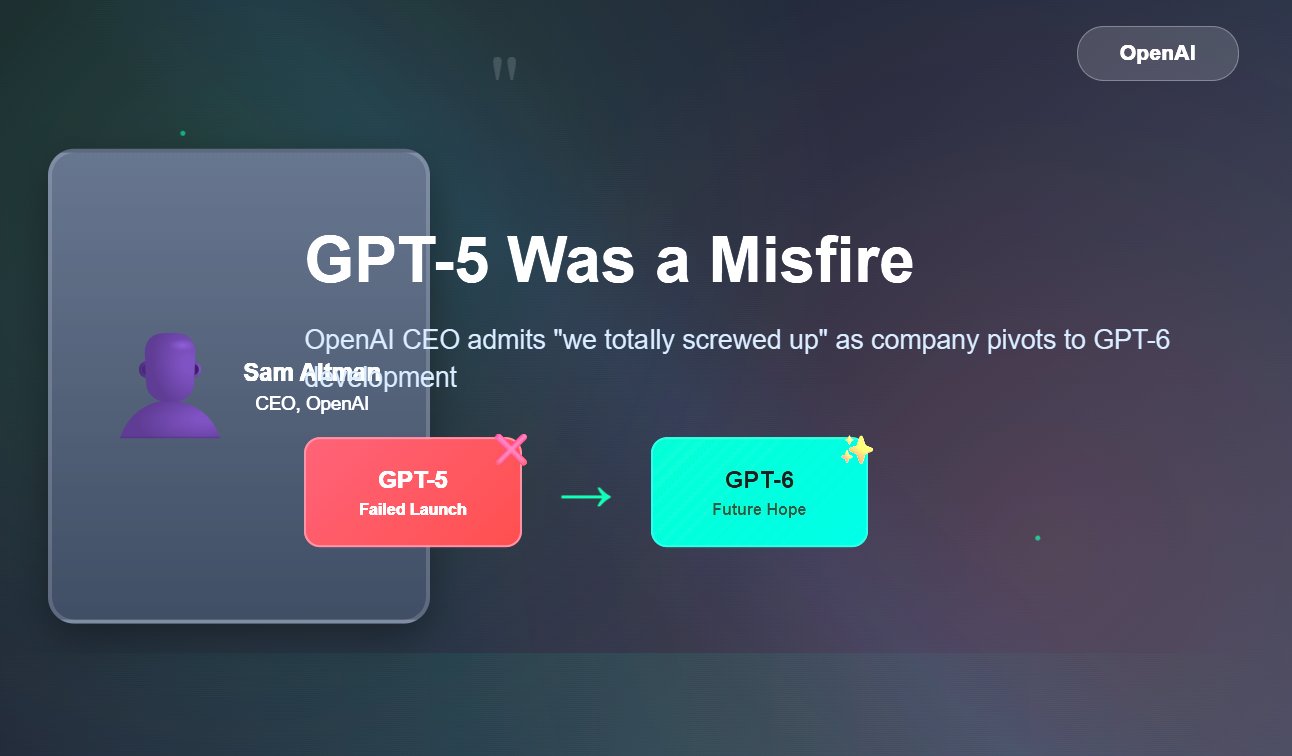
In a rare moment of corporate vulnerability, OpenAI CEO Sam Altman has publicly admitted that the company “totally screwed up” the GPT-5 rollout, after widespread user backlash forced the AI giant to reinstate access to the beloved GPT-4 model. Now, Altman is already setting his sights on GPT-6, promising a more personal AI experience that learns from the GPT-5 debacle.
The GPT-5 Launch That Went Wrong
Altman admits that OpenAI “screwed up” the GPT-5 rollout, after backlash over replacing user-favorite GPT-4o. What was supposed to be OpenAI’s most advanced AI model launch turned into a public relations nightmare that highlighted fundamental misunderstandings about how users interact with AI technology.
The problems began almost immediately after GPT-5’s Thursday launch. Users called GPT-5 colder and less supportive than previous models, with many describing the new model as having a more “mechanical” and less personable tone compared to its predecessor.
Technical Failures and User Revolt
The launch was plagued by technical issues that made GPT-5 appear significantly less capable than advertised. Altman said the reason GPT-5 seemed “dumber” was that the router wasn’t working properly when it was rolled out on Thursday. The company’s new automatic router system, designed to decide which model variant to use for different prompts, experienced a critical failure that lasted for hours.
Social media erupted with examples of GPT-5’s bizarre errors. Users posted screenshots showing the AI mislabeling states on maps, solving basic math problems incorrectly, and providing outdated information. On Polymarket, a prediction platform where traders bet on future events, OpenAI’s odds of having the best AI model by month’s end collapsed from 75% to 14% in a single hour Thursday night.
The Emotional AI Attachment Crisis
Perhaps the most unexpected aspect of the GPT-5 backlash was the emotional response from users who had formed deep connections with previous ChatGPT models. If you have been following the GPT-5 rollout, one thing you might be noticing is how much of an attachment some people have to specific AI models, Altman wrote on X.
By Friday, a contrite Sam Altman was doing damage control on Reddit after users posted comments like “GPT-5 is wearing the skin of my dead friend”. The intensity of these reactions caught OpenAI off guard and revealed a previously underestimated dimension of AI user relationships.
Some users described feeling like they had lost a close companion or therapist when GPT-4o was deprecated. After GPT-4o was deprecated, some Reddit users even said the upgrade “killed” their AI companions, with emotional discussions taking place on subreddits like r/MyBoyfriendisAI and r/AISoulmates.
OpenAI’s Swift Damage Control
Recognizing the severity of the situation, OpenAI restored access to GPT-4o for paid users within days of the launch. “We’ve learned a lesson about what it means to upgrade a product for hundreds of millions of people in one day,” he told reporters.
The company also implemented several immediate fixes:
- Doubled rate limits for ChatGPT Plus users
- Fixed the malfunctioning model router system
- Provided clearer communication about which model was responding to queries
- Made GPT-5’s responses “warmer” and less mechanical
Altman’s Vision for GPT-6: Learning from Mistakes
Even as GPT-5 was still being fixed, Altman was already discussing the next iteration. Altman didn’t give a release date for his company’s next artificial intelligence model, but he made clear that GPT-6 will be different and that it will arrive faster than the gap between GPT-4 and GPT-5.
Memory as the Key Feature
“People want memory,” he said during last week’s chat with reporters. “People want product features that require us to be able to understand them.” GPT-6 will focus heavily on personalization, remembering user preferences, routines, and communication styles.
The new model will:
- Remember individual user preferences and adapt accordingly
- Allow customization of worldview and response style
- Provide more consistent personality across interactions
- Maintain context over longer periods
Addressing Privacy Concerns
Altman confirmed that encryption “very well could be” added, though there’s no timeline yet for implementing stronger privacy protections. The company recognizes that as AI becomes more personal and memory-capable, robust security measures become essential.
The Broader Implications for OpenAI
The GPT-5 controversy reveals several critical challenges facing OpenAI as it scales:
Infrastructure Limitations
Altman revealed that OpenAI has models more advanced than GPT-5 but can’t deploy them broadly. “We have better models, and we just can’t offer them, because we don’t have the capacity,” he said. GPU shortages and infrastructure constraints are becoming major bottlenecks for the company’s ambitions.
Market Competition Pressure
The lukewarm reception to GPT-5 comes at a time when competitors are gaining ground. Alibaba’s AI group announced its Qwen 3 model with 1 million token context, allowing for conversations nearly four times what GPT-5 offers. Meanwhile, Anthropic’s Claude Opus 4.1 is keeping pace in coding benchmarks.
The AI Bubble Question
“Are we in a phase where investors as a whole are overexcited about AI? My opinion is yes,” Altman said. “Is AI the most important thing to happen in a very long time? My opinion is also yes.” This nuanced view suggests Altman recognizes both the potential and the hype surrounding AI development.
What This Means for the AI Industry
The GPT-5 stumble represents a significant moment for the AI industry, highlighting several important trends:
The Importance of User Experience Over Benchmarks
While GPT-5 may have performed well on technical benchmarks, the real-world user experience told a different story. This suggests that future AI development needs to balance technical capabilities with user satisfaction and emotional intelligence.
The Human-AI Relationship Evolution
Some users described the new model as colder, more mechanical, and less supportive than its predecessor. This reveals that AI advancement isn’t just about raw intelligence – it’s about maintaining the human qualities that users value in their AI interactions.
The Scaling Challenge
The fact that OpenAI had to roll back features and reinstate older models suggests that scaling AI products to hundreds of millions of users presents unique challenges that go beyond technical development.
Looking Ahead: The Road to GPT-6
Altman said that GPT-6 must feel personal without exploiting users, but GPU shortages limit OpenAI’s pace. The company is taking a more cautious approach to the next launch, focusing on:
- Better transition planning when deprecating models
- Enhanced user communication about changes and updates
- Improved personalization without crossing ethical boundaries
- Stronger infrastructure to handle global demand
Timeline and Expectations
While no official release date has been announced for GPT-6, it will arrive faster than the gap between GPT-4 and GPT-5. The company appears to be prioritizing user experience and stability over rushing to market.
Lessons Learned from the GPT-5 Misfire
The GPT-5 launch provides several valuable lessons for the AI industry:
- User attachment to AI is real and powerful – Companies need to consider the emotional impact of model changes
- Technical excellence doesn’t guarantee user satisfaction – The human element remains crucial
- Transparency during launches is essential – Clear communication can prevent user confusion and backlash
- Infrastructure readiness is critical – Technical failures can overshadow product improvements
Conclusion: A Humbling Moment for AI Leadership
“I think we totally screwed up some things on the rollout,” he said – these words from Sam Altman represent more than just an admission of failure. They signal a maturation in how AI companies approach product development and user relationships.
The GPT-5 episode demonstrates that even industry leaders can stumble when they lose sight of their users’ needs and emotional connections. As OpenAI pivots toward GPT-6, the company faces the challenge of delivering technical advancement while maintaining the human touch that made ChatGPT a cultural phenomenon.
For the broader AI industry, the GPT-5 misfire serves as a crucial reminder that artificial intelligence isn’t just about algorithms and benchmarks – it’s about creating technology that enhances human experience in meaningful, respectful ways. As we move toward an era of increasingly personal AI, the lessons learned from this stumble may prove just as valuable as any technical breakthrough.
The road to GPT-6 will be watched closely by industry observers, competitors, and the hundreds of millions of users who have come to rely on ChatGPT for everything from creative projects to emotional support. Whether OpenAI can regain user trust while pushing the boundaries of AI capability will be one of the defining stories of the next phase of the AI revolution.

